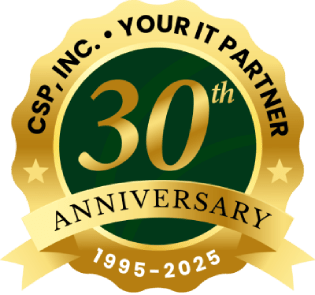Existing CSP Client: (919) 424-2060
SALES: (919) 420-3231

CryptoWall is a ransomware/Internet malware threat that can be very disruptive and costly to those that become infected. Once infected, all files on the user’s workstation and server(s) are encrypted and can no longer be used. The threat is categorized as ransomware because, once the infection occurs, the victim is presented with a means with which to remove the threat and recover (decrypt) files by paying a ransom within a certain timeframe (often $500, $1000, or more). While paying the ransom can result in receiving the code to decrypt files, there’s no guarantee.
How does CryptoWall work?
The threat typically arrives via:
Keep in mind, there have been reports that CryptoWall has been linked to some advertising sites that serve up advertising for many commonly used web sites. If this situation occurs, following a link to what seems like a reputable site may cause an infection. There have also been reports that a compromised site may display a “faux pop-up” in an attempt to get the user to click on it.
As you might expect, spam engines are updated continuously, trying to eliminate spam and email that contains threats. However, the “bad guys” are always trying to stay a step ahead of the spam removal systems and are continually re-crafting their emails to avoid detection and to entice the reader to click on a link that will cause the infection.
How will I know if my systems become infected?
There are a couple of ways the ransomware presents itself:
*DECRYPT_INSTRUCTION.txt
*DECRYPT_INSTRUCTION.html
*DECRYPT_INSTRUCTION. url
If you click on any of these files, instructions will be presented regarding how to make the ransom payment.
What should I do if I think I’m infected?
If you believe you have been infected, physically disconnect your PC from the network immediately and contact CSP at (919) 424-2060. Depending upon your individual situation and the extent of the damage to your network resources, CSP will recommend the proper remediation steps.
If you suspect you have any other type of virus or malware infection, you should also contact CSP at (919) 424-2060 and CSP will recommend the proper diagnosis and remediation steps.
If you have opted to utilize the CSP-managed antivirus system, please be aware that CSP will automatically receive an alert if an infection is detected and will contact you to gather more information and to assist with remediation.
What can I do to prevent an infection?
The best way to prevent infection is to follow the following basic “safe computing practices:”
How can I minimize loss of data in the event of infection?
The answer is simple: have up-to-date backups stored offsite. In most of the CryptoWall infections that CSP has responded to, the client has maintained a robust backup process managed by CSP. When CryptoWall was detected and the threat removed from the systems, the most recent backup was restored and minimal data loss was experienced. No payment of ransom was required.
Additionally, it is imperative that machines stay up-to-date with Microsoft updates, antivirus updates, third party software updates, etc. CSP-managed systems are set up to keep these machines up-to-date, if the machines are left on periodically at night (as described above) to receive the updates.
In summary…
The bad guys will continue to try to find new ways to make money by infecting your systems to either convince you to pay a ransom or steal your private information in an effort to make money (or take money) from your or your customer’s accounts. By putting the right protections in place and then following safe computing practices, you can prevent most infections and minimize the impact of those you and your users do get.
CSP would be happy to discuss your IT security needs. Please do not hesitate to contact us at (919) 424-2000 or send us an email: info@cspinc.com. Stay safe, and as always, thanks for choosing CSP!
Michael Bowman
Virtual CIO
CSP, Inc.
919-424-2008
mbowman@cspinc.com

Always at your service to provide the highest level of quality support to our customers.

Anthony Firth Client Engineer

“I’m passionate about building and fostering relationships, and finding solutions for success.”

Michael Koenig Client Account Manager

“I help clients stabilize and grow their IT infrastructure so they can focus on growing their core business.”

Josh Wilshire Systems Engineer Team Lead

“I strive to provide the highest level of quality service to our customers.”

Tommy Williams Sr. Hardware Engineer

“I’m driven by the steadfast belief that technology must serve as a business enabler. This mantra has driven 21
Years of successful partnerships.”

Stephen Riddick VP Sales & Marketing

“CSP doesn’t succeed unless your company succeeds.”

Stephen Allen Inventory Manager

“Through my intuition and genuine concern to help others I have built long-lasting relationships with our customers, co-workers and business partners.”

Scott Forbes VP Support Services

“Every day, I work with clients to help plan the future of their businesses.”

Michael Bowman vCIO

“Your IT problems become our IT solutions.”

Mark McLemore Project Engineer

“Managing internal and external operations to ensure that CSP provides quality and reliable customer service .”

Margie Figueroa Business Manager

“Providing quality internal and externals financial support to our customers and accounting support to CSP.”

Katie Steiglitz Accounting Administrator

“Some call me the CEO. I call myself the Cheerleader for an awesome team!”

William B. Riddick Founder & CEO

“CSP is here to assist you with your IT needs.”

Beth Wylie Inside Sales Manager




On What Questions You Need To Ask Before Signing Any Agreement.
"*" indicates required fields

Raleigh IT Support Company and IT Services Provider | CSP Inc.
1310 Nowell Rd,
Raleigh, NC 27607
Existing CSP Client: (919) 424-2060
SALES: (919) 420-3231
Receive email updates and informative marketing materials by subscribing to our newsletter.
"*" indicates required fields